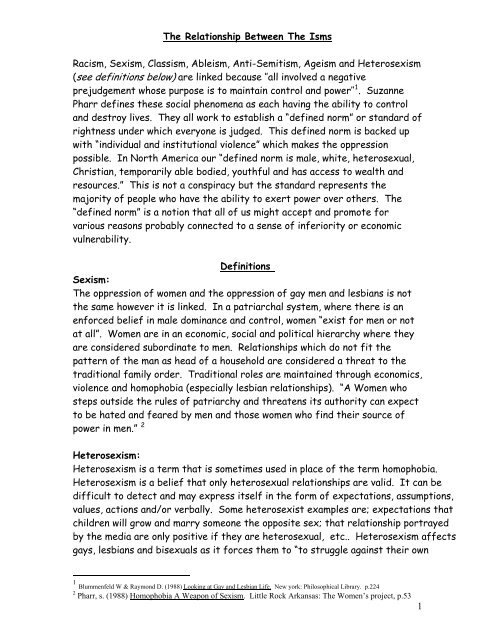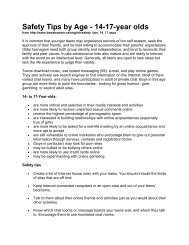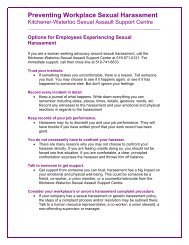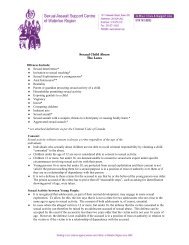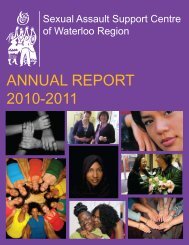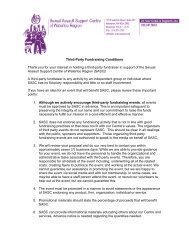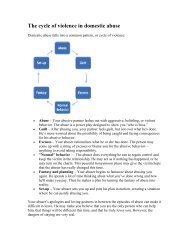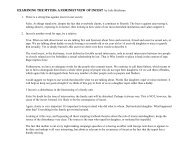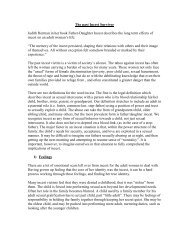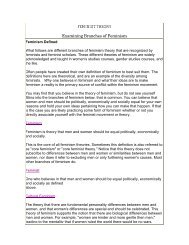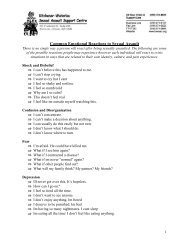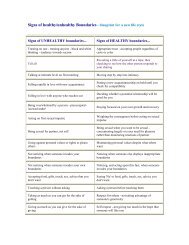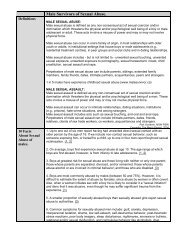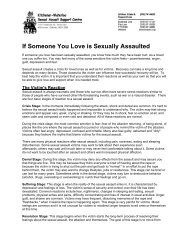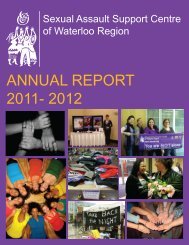The Relationship Between The Isms
The Relationship Between The Isms
The Relationship Between The Isms
You also want an ePaper? Increase the reach of your titles
YUMPU automatically turns print PDFs into web optimized ePapers that Google loves.
<strong>The</strong> <strong>Relationship</strong> <strong>Between</strong> <strong>The</strong> <strong>Isms</strong><br />
Racism, Sexism, Classism, Ableism, Anti-Semitism, Ageism and Heterosexism<br />
(see definitions below) are linked because ‘’all involved a negative<br />
prejudgement whose purpose is to maintain control and power’’ 1 . Suzanne<br />
Pharr defines these social phenomena as each having the ability to control<br />
and destroy lives. <strong>The</strong>y all work to establish a “defined norm” or standard of<br />
rightness under which everyone is judged. This defined norm is backed up<br />
with “individual and institutional violence” which makes the oppression<br />
possible. In North America our “defined norm is male, white, heterosexual,<br />
Christian, temporarily able bodied, youthful and has access to wealth and<br />
resources.” This is not a conspiracy but the standard represents the<br />
majority of people who have the ability to exert power over others. <strong>The</strong><br />
“defined norm” is a notion that all of us might accept and promote for<br />
various reasons probably connected to a sense of inferiority or economic<br />
vulnerability.<br />
Definitions<br />
Sexism:<br />
<strong>The</strong> oppression of women and the oppression of gay men and lesbians is not<br />
the same however it is linked. In a patriarchal system, where there is an<br />
enforced belief in male dominance and control, women “exist for men or not<br />
at all”. Women are in an economic, social and political hierarchy where they<br />
are considered subordinate to men. <strong>Relationship</strong>s which do not fit the<br />
pattern of the man as head of a household are considered a threat to the<br />
traditional family order. Traditional roles are maintained through economics,<br />
violence and homophobia (especially lesbian relationships). “A Women who<br />
steps outside the rules of patriarchy and threatens its authority can expect<br />
to be hated and feared by men and those women who find their source of<br />
power in men.” 2<br />
Heterosexism:<br />
Heterosexism is a term that is sometimes used in place of the term homophobia.<br />
Heterosexism is a belief that only heterosexual relationships are valid. It can be<br />
difficult to detect and may express itself in the form of expectations, assumptions,<br />
values, actions and/or verbally. Some heterosexist examples are; expectations that<br />
children will grow and marry someone the opposite sex; that relationship portrayed<br />
by the media are only positive if they are heterosexual, etc.. Heterosexism affects<br />
gays, lesbians and bisexuals as it forces them to “to struggle against their own<br />
1 Blummenfeld W & Raymond D. (1988) Looking at Gay and Lesbian Life. New york: Philosophical Library. p.224<br />
2 Pharr, s. (1988) Homophobia A Weapon of Sexism. Little Rock Arkansas: <strong>The</strong> Women’s project, p.53<br />
1
invisibility, and makes it much more difficult for them to integrate a positive sexual<br />
identity”. 3<br />
Homophobia:<br />
Homophobia is the irrational fear and hatred of those who love and sexually<br />
desire those of the same sex. Homophobia ranges from dislike and avoidance<br />
of homosexuals, to discrimination against them in employment, to acts of<br />
violence sometimes referred to as ‘gay bashing’. <strong>The</strong> word phobia implies an<br />
irrational fear.<br />
Racism:<br />
Racism is defined as “the belief that races have distinctive cultural<br />
characteristics determined by hereditary factors and that this endows some<br />
races with an intrinsic superiority over others; abusive or aggressive<br />
behaviour towards member of another race on the basis of such belief”. 4<br />
Racism, like homophobia, ranges from dislike and avoidance of particular<br />
racial groups, to discrimination in employment, to violent and aggressive acts.<br />
Racism can express itself through subtle actions or assumptions to direct<br />
aggressive action taken against a specific race.<br />
Classism:<br />
Classism refers to prejudicial beliefs and or behaviour towards “groups of<br />
persons sharing a similar social position and certain 5 economic, political and<br />
cultural characteristics”.<br />
Ableism:<br />
Ableism refers to the discrimination and prejudice towards people who are<br />
physically or mentally challenges.<br />
Anti- Semitism:<br />
Anti-Semitism refers to political, social and economic agitation and activities<br />
directed against Jewish people. Anti-Semitism follows the theory that<br />
people of Aryan stock are superior in physique and character to those of<br />
Semite stock, developed in Germany in mid 19 th century. 6<br />
Ageism:<br />
Ageism refers to “prejudice or discrimination against a particular age-group<br />
and especially the elderly.” 7<br />
3 ibid. p. 244<br />
4 <strong>The</strong> Collins English Dictionary (1986) Great Britain: William Collins Sons & Co. Ltd., p.1259<br />
5 ibid. p.293<br />
6 “Anti-Semitism,” Microsoft Encarta 96 Encyclopedia. 1993-1995 Microsoft Corporation. All rights<br />
Reserved. Copyright Funk & Wagnalls Corporation. All rights reserved.<br />
7 http://www.m-w.com/cgi-bin/dictionary?book=Dictionary&va=ageism, Page accessed: April 14, 2004<br />
2


